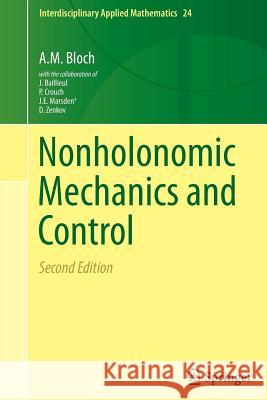Nonholonomic Mechanics and Control » książka



Nonholonomic Mechanics and Control
ISBN-13: 9781493938216 / Angielski / Miękka / 2016 / 565 str.
Nonholonomic Mechanics and Control
ISBN-13: 9781493938216 / Angielski / Miękka / 2016 / 565 str.
(netto: 234,32 VAT: 5%)
Najniższa cena z 30 dni: 219,73
ok. 16-18 dni roboczych.
Darmowa dostawa!
This book explores connections between control theory and geometric mechanics. The author links control theory with a geometric view of classical mechanics in both its Lagrangian and Hamiltonian formulations, and in particular with the theory of mechanical systems subject to motion constraints.
"As a nice learning tool, the book is intended for graduate students, Ph.D. students, scientists and engineers in academia and industry." (Clementina Mladenova, zbMATH 1381.70004, 2018)
"... A well-written and comprehensive reference that can be used as a graduate-level textbook, complete with exercises. The book also gives a nice history of the development of the methods covered, and it is an excellent resource for references for further reading. ... The book's background material in differential geometry, mechanics, and geometric control gives the book a timeless feel, while the extensive coverage of recent research results conveys the vitality of the field. This book will make an excellent reference for students and researchers in differential geometric control. It will also make a fine textbook for engineering graduate students with a background in differential geometry. For graduate students with a more traditional engineering mathematics background, portions of this book can be coupled with supplementary reading and example-based introduction of the relevant mathematical concepts." (IEEE Transactions on Automatic Control)
"This book is a welcome addition to the existing literature and will certainly become a standard reference."
"Bloch's book will be a continuing source of inspiration for further research in this area."
"this is a delightful book that will be valuable for both the control community and researchers"
"It is reasonably 'easy' to write a difficult and obscure book about this theory, but it is much more difficult to write a book that provides clear access to the topic, which
intrinsically has many facets. The author has invested considerable effort in achieving this goal.""The author should be congratulated for such an admirable job."
(A.J. van der Schaft, IEEE Control System Magazine, June, 2005)
"After reading this book the reader will be convinced that the aim of the book - to integrate the intimately related disciplines which have evolved to a great extent almost independently of each other and gave rise to two separate research communities - is successfully reached. "
"It is also worthy of note that the author together with his collaborators presents one of the best teams in the area of the modern nonholonomic mechanics and control theory."
(Clementina Mladenova, Zentralblatt MATH, Vol. 1045 (20), 2004)
"The aim of this book is 'to provide a unified treatment of nonlinear control theory and constrained mechanical systems that will incorporate material that has not yet made its way into texts and monographs'. ... the authors of the present book have contributed a great deal to the way in which nonholonomic systems are currently understood ... . The book constitutes an accurate reflection of this work, and covers a broad variety of topics and problems concerning nonholonomic systems and control." (Jorge Cortes, Mathematical Reviews, 2004e)
"well-written and comprehensive"
"This book is unique in that the inquiry is focused on nonholonomic mechanical systems (tho
ugh many of the methods introduced can be applied to other systems). This allows a deeper and more comprehensive treatment of this subject""The extensive coverage of recent research results conveys the vitality of the field. This book will make an excellent reference for students and researchers in differential geometric control. It will also make a fine textbook for engineering graduate students"
(Kevin M. Lynch, IEEE Transactions on Automatic Control, Vol. 49 (5), May, 2004)
Introduction.- Mathematical Preliminaries.- Basic Concepts in Geometric Mechanics.- Introduction to Aspects of Geometric Control Theory.- Nonholonomic Mechanics.- Control of Mechanical and Nonholonomic Systems.- Optimal Control.- Stability of Nonholonomic Systems.- Energy-Based Methods for Stabilization.- References.- Index.
This book explores some of the connections between control theory and geometric mechanics; that is, control theory is linked with a geometric view of classical mechanics in both its Lagrangian and Hamiltonian formulations and in particular with the theory of mechanical systems subject to motion constraints. The synthesis of the topic is appropriate as there is a particularly rich connection between mechanics and nonlinear control theory. The book provides a unified treatment of nonlinear control theory and constrained mechanical systems and illustrates the elegant mathematics behind many simple, interesting, and useful mechanical examples. It is intended for graduate students who wish to learn this subject and researchers in the area who want to enhance their techniques.
The book contains sections focusing on physical examples and elementary terms, as well as theoretical sections that use sophisticated analysis and geometry. The first four chapters offer preliminaries and background information, while the remaining five are broken down into chapters on nonholonomic mechanics, control and stabilization, optimal control, energy-based, and recent energy-based techniques for mechanical and nonholonomic systems.
The second edition of the book extends many of the topics discussed in the first edition to incorporate both new research and more historical background. The additional material includes work on the Hamel equations and quasivelocities, discrete dynamics, bo
th holonomic and nonholonomic, Hamiltonization, and the Hamilton-Jacobi equation. In addition new examples and exercises have been added.
Review of earlier Edition (A.J. van der Schaft, IEEE Control System Magazine, 2005 )
This book can be read on many different levels and has been described as a “delightful book that will be valuable for both the control community and researchers” .
1997-2026 DolnySlask.com Agencja Internetowa
KrainaKsiazek.PL - Księgarnia Internetowa









